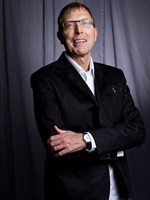Digital marketing is about total integration into a business across all levels - from business strategy to marketing strategy and investment in digital intelligence. It is the future of business.
Those at the top of the digital game in the South African market decry attempts to continue to define digital marketing as another channel, instead positioning it as a new approach to marketing which offers deeper insights into consumer behaviour through that other buzzword: big data.
Digital marketing is the most important strategic business challenge for marketing departments, because it involves a new skills set and a new way of thinking. It requires immersion in the subject and constant further study when courses haven't even yet been drafted for all there is to know on the subject.

"Every 24 hours I get old because there is something new. You can't possibly know everything," says Bronwen Auret, MetropolitanRepublic head of digital operations.
From social media to apps, wearables and big data, to smart homes and Periscope, new technologies and software are being released constantly to add to the marketer's workload. Some of it is the stuff of science fiction novels as high tech enters our homes, our cars, the workplace and our very clothes and accessories - all measurable and all able to provide instant feedback.
All this data and instant feedback is the stuff of marketing dreams, but can also become a nightmare to manage and understand if the right strategies, software and people are not in place, led by business and marketing leaders with vision.
There is no end to the bombardment of information and new knowledge being generated on this subject daily, and the only way to keep up is to know your customer base intimately; read everything you can on the subject; have a team of experts on board - whether through your agencies or consultants; and to truly embrace becoming a learning organisation.
There seems to be a clear generational knowledge gap emerging and this is resulting in a distinct lack of a deep understanding by business leaders and many brands as to what is required and how to go about harnessing the data that is available. Digital agencies note that their marketing clients do not understand big data, lack the internal capacity to analyse the data they hold, and fail to understand true digital integration within the organisation.
Auret, in turn, believes digital marketing takes strong and fearless leadership - and a millennial mindset. "In this day and age, people are also very scared to be associated with negativity when they are making money. In this economic environment, every brand is looking to scale down, so brands are scared to be too courageous. They need to be cognisant of the times we live in - we don't have too many disruptive brands in South Africa."
Auret also believes there is a skills shortage in terms of skilled digital marketing qualified people.
"Marketers are absolutely frightened of data. We have crossed into an era where people are not only required to think about data and about the brand, but in order to make a lot of sense in the digital world, you have to have quite an astute understanding to architect all the systems behind digital marketing, like customer experience - from the user journey, where they touch me, how they touch me, from the first point of contact to the second purchase, put measurement behind that, test and optimise against the data, your preconceptions - and tie that back into marketing, which is making people aware of your brand and making them buy your product."
The big difference, Auret says, is that there is more intelligence available in how marketers can put data and technology together. The age of great marketers is returning, Auret predicts and marketers need mindful leadership and courage.

The most common complaint levelled at brands and mainstream advertising agencies is that they still operate digital as a separate division, keeping it in a silo and using it as an add-on channel to other media channels. Much of it is the result of a lack of a coherent 'worldview' on the subject, as well as narrow thinking in a time when crisis thinking and immediate turnarounds on ideas and reputation management issues, is required to maximise opportunity and also to deal with social media negativity.
Fogg Experiential Design chief strategy officer, Prakash Patel, moved from the UK to South Africa over a decade ago after working across Europe at the beginning of the digital revolution in marketing. He believes that social media has been the biggest disruptor in digital marketing and mobile is the biggest gamechanger. Despite this, marketers are still grappling with understanding digital as a total user experience, he says.
"We are not seeing the total digital experience. Building a business in the online space - that is making digital part of your business strategy. Many marketers do understand the medium digital, but they are still struggling to integrate it with other models.
"Marketers are talking about how they work in the digital space, but they are not thinking about the consumer. The word integration has been around for decades, they still don't get that it is a strategic imperative," Patel says.
What he still sees unfortunately, is agencies and marketing departments which fragment how they work with digital, with PR, web, social, digital, IT, marketing still sitting separately in organisations.
Patel says what marketers and their agencies need to keep in mind: digital marketing is about solving business problems. "Not beautiful apps, awards, gorgeous offices, gimmicks and games. We grow brands, make sales and create leads. It is about growing digital, about craft and it needs grown-up policies and business strategy.
As an agency, The Jupiter Drawing Room (Cape Town), hasn't made a big noise about digital transformation as Kevan Aspoas, chairman and CEO, says they have been integrating digital into the agency one department at a time and focussing on finding a model that will work for their clients going forward.
"We have consciously not gone out and bought a digital agency and housed them at the bottom of the passage. Digital is not a tag-on, but an intricate part of how we do business. Digital has to become part of our vocab on a daily basis. It's how we see the world."
And he is blunt about what will happen to staff who do not make the mindshift change to digital and take advantage of the courses on offer to upskill: "If they don't change, they won't be part of our world going forward."
Aspoas believes the mega trend in the industry is that we are nearing the end of the era of the "isolation of digital folk", whether it be in their own agencies or in their own thinking. Jupiter Cape Town hired Dale Imerman as its digital director to help integrate digital thinking throughout.

Imerman explains: "We are not looking to form a segmented little digital department that is slotted into the agency at some point. This is about integrating digital in every department, and gearing up each department with the right digital skills and knowledge, and exposure to actual practical work for clients, through training and introducing new people to the teams to introduce new skills, new projects and learning by doing."
140 BBDO managing director Adrian Varkel agrees that true integration is the ultimate goal, but in practice, it is another story. "We don't go mobile first or TV first. We understand our customer first. We start at the beginning: be strategic first and understand what our business is trying to achieve. At the end of the day we want to reach the customer first. Channel agnostic, customer first."
Varkel feels people in the industry are overfocusing on 'digital' and missing the consumer. "The customer engages on many different channels. Digital is a very prevalent channel and we need to understand why they are using a particular channel. How are they engaging, why are they engaging, we have to mature in the digital marketing arena. A lot of stuff is still about prizes and competition."
The first step, says Varkel, is to evaluate what the current problem is that their client has in order to solve it. "Apps are cool and win awards, but are they having an effect on the business? Probably not, We need to go back to strategy, to the objectives we are trying to achieve."
Di Charton, digital marketer and senior lecturer at the Red & Yellow advertising school, says this is a time of disruption, as technology guru Ray Wang outlines in his book 'Disrupting Digital Business: Create an Authentic Experience in the Peer-to-Peer Economy'.
"The key takeout is within the shifts happening in business. You can't iteratively transform, you have to disrupt. Digital becomes the enabler. The book also talks about using digital to ascertain what is happening through predictive modelling - the algorithms predict what ads I should be interested in. A lot of how we are currently using digital, is about how or why consumers didn't buy something. But it will move to a point where we are predicting what you are going to do - from augmented humanity..."
As a marketer if you cannot be digital first in the way you operate, the way you think and the way you provide service to your customers, you probably won't outlast the disruptor brands, warns Auret. "Our landscape is changing very quickly. We are going to see technological disruption from brands that aren't even in SA yet. There are very interesting challenges ahead in the next five years."
For agencies, their jobs remain the same: "The first thing we need to do as an agency is create brand love; and secondly, to make the cash register ring. It is not as big or audacious as it is made out to be. Digital marketing permeates all the different marketing areas and from a key performance perspective, it allows people to understand what is a conversion, a retained customer and the different channels that drive it there. I'm able to track and measure the impact on our client's brands," says Auret.
What Charton loved about the book, was that it urges businesses to start with the reasons why they are in business. "There are many businesses which don't know the reasons why they are in business. Ray Wang talks about the same thing: within a digitally enabled economy where transparency is one of the new currencies we are looking at, everything we do is available for someone to see.

CEO of World Wide Creative and co-founder of Heavy Chef, Fred Roed, who is also head of agencies at the Interactive Advertising Bureau (IAB SA), says interest in digital marketing is at a level not seen before and there is a definite "sea change" in the industry as people know it has to be "digital first" as traditional marketing channels are linked "like a thread" by digital.
"Digital is a far more integrated space, a far more interesting space and a far more complicated space for marketers to grasp. Creatively, we are not there yet, we are about two years behind in enabling clients and brands to use digital tools. From an investment point of view, corporate spend on digital is about five years behind as mainstream channels still dominate."
Roed said things are changing rapidly, such as the increase in smartphone penetration in South Africa and the rollout of 3G penetration across Africa - 70% by 2020 across the continent. The big international trend is of course the Internet of Things, with wearables a whole factor on its own, Roed says. South African marketers can expect wearables to take a significant foothold in South Africa over the next few years.
"Brands are starting to insist on digital first. We're not talking about the death of traditional channels, particular in the vernacular section, but digital is integrating everything... the lifecycle, reach, frequency, rich narrative is compelling, amplified by people sharing it to social media."
Varkel says there are still lots of "smoke and mirrors" in the industry, but despite the fact that there are new rules and new places to play in, the end result is the same: doing better business and generating leads - the basics of marketing and advertising and understanding the consumer.
His advice to clients is that a digital strategy does not exist alone, but is part of brand strategy because the ultimate goal is business success. "Our biggest challenge is still around how to operate in the digital space and how digital fits together with non-digital activity on the client side."
Varkel is clear that the "territorial wars" between the different agencies involved in client briefs, be they digital, advertising, PR or social, etc, needs to stop.
"We need to put our egos in our back pocket and we need to look at what the client needs and what the brand needs. We both know what good looks like and we need to deliver integrated offerings as agencies and digital partners. We can share the glory of the good work. I want to do work I'm proud of."
